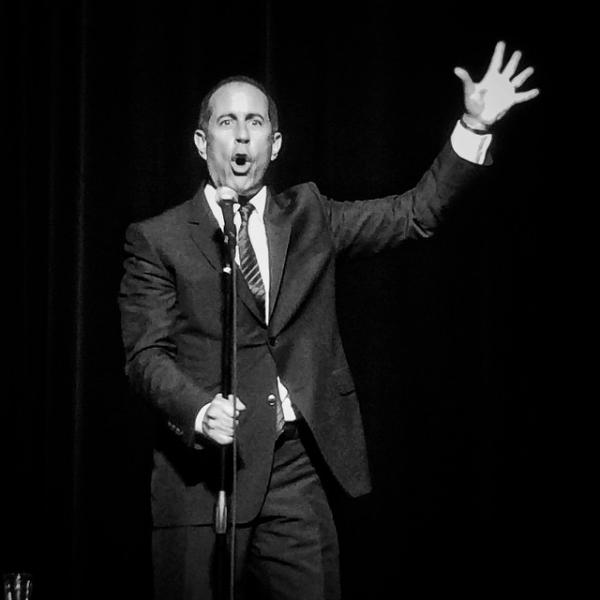Autism Speaks Through Seinfeld

“So you’re saying you really do think you’re special!" my mom responded. "Special ed.” Normally I would have chuckled at her comment without any emotional charge, but I suddenly found myself slightly offended. That was the moment I realized that I questioned my own affiliation with the disorder.
Critics claim that Seinfeld is not helping autism with what some are calling his self-diagnosis. There are fears that by connecting himself to the disorder, Seinfeld could have negative effects on the development of programs and services benefitting severe cases of autism by over-simplifying a complex disorder which can require a lifetime of assistance.
Seinfeld’s identification with the disorder and his bright outlook on how to deal with it, however, is more beneficial than it is harmful. His confession raises awareness of autism and provides comfort to adults who may unknowingly suffer from a high-functioning form of the disorder. I also believe that his confession could encourage adults who wonder if they have the disorder to look more determinedly into an official diagnosis.
READ MORE: Post-War Aid Packages Lack Mental Health Provisions
As a respected comedic figure who appears to lead a fairly balanced life, Seinfeld associating himself with autism gives the disorder a positive and less-expected face. I personally was not fully aware that autism was a scale, and I had a pretty specific idea of what being autistic looked like as the cases of autism I have observed demonstrated a marked difference in social behaviors.
For many autistic individuals, the flip side of the painful social disability is being gifted. While we may have seen this in the form of the artistic expressions that some of the more severely autistic individuals have produced, realizing that Seinfeld’s comedic ability may also be a product of autism shines a different kind of spotlight on the disorder. The public has largely associated Seinfeld as someone part of their group—someone "normal," as well as talented and funny. By establishing himself as someone who is autistic, Seinfeld bridges a mental gap because we feel on a certain level that we know Jerry. Suddenly autism isn’t so far away.
For many years I felt that something was unusual about me. Two summers ago, while on a hike, my dad asked if he could bring up a serious topic. He confessed that he had wondered a number of times if I was autistic. I had met him and his family only seven years earlier and he said he had noticed certain signs pretty quickly. I dismissed his questioning, but over the past two years I have wondered if perhaps he was on to something.
For as long as I can remember, I’ve had difficulty when it comes to interacting with people. I remember special programs in school, special testing that never yielded clear results and my best friend growing up telling me to use my “inside voice.” Eventually I trained myself to pay attention to my volume as a child. I remember the same friend explaining that sometimes people didn’t want to be touched and needed more space. At different points in my life there was Ritalin and counseling to try and direct my attention where it “should have been.”
It is difficult to recognize myself as “other” socially. I sit at a table next to a group of students who effortlessly carry on more than one conversation at a time. For my brain, listening to two conversations at once is like putting the wrong ends of the jumper cables on a car battery. It’s uncomfortable. My brain wants to connect and allow me to hear everything at once, but I end up missing details and not fully understanding either conversation.
In a society in which flexibility and multi-tasking are extremely powerful and valued tools, I find myself feeling frequently at a disadvantage. But to acknowledge disability is nothing less than terrifying for me, because to do so or to receive a confirmative diagnosis would mean that to some degree I am weak.
READ MORE: What Columbine, 'Slender Man' And Elliot Rodger Tell Us About Mental Health Stigma
While I have not been diagnosed, when someone like Seinfeld becomes a new face to associate with autism, suddenly I become less focused on the idea of weakness that I feel having the disorder might entail, and more focused on how I could best use and build upon my unique strengths. I’m very focused on the small details. Instead of thinking, “why can’t I see this big picture like they do,” the thought becomes, “Great! Now where I can play up and use my attention to detail?” In feeling empowered rather than minimalized, I am more inspired to look into seeking relief in an official adult diagnosis rather than denying and hiding from one.
With the emergence of high-profile, high-functioning autistic individuals, others who suffer similar yet individual challenges may feel just a little more “normal” and feel less of the negative stigma they may believe exists for them.
Perhaps the most important take-away when looking at the benefit in Seinfeld identifying with the autistic community is that it causes us to think. Never before have I been offended when I’ve heard a special ed joke fired my way. However, when autism was brought a little closer to home, the implications of the joke became real.
Seinfeld made the issue of autism more tangible, and that is rarely negative when it comes to disorders, research and the development of treatment and programs. Whether or not Seinfeld just has particular tendencies or is definitely on the autism scale, is not important. In simply sharing a thought, he has shared his spotlight with a disorder that could always use some more time on the stage.
Contact Contributor Marisa Zocco here; follow her on Twitter here.



